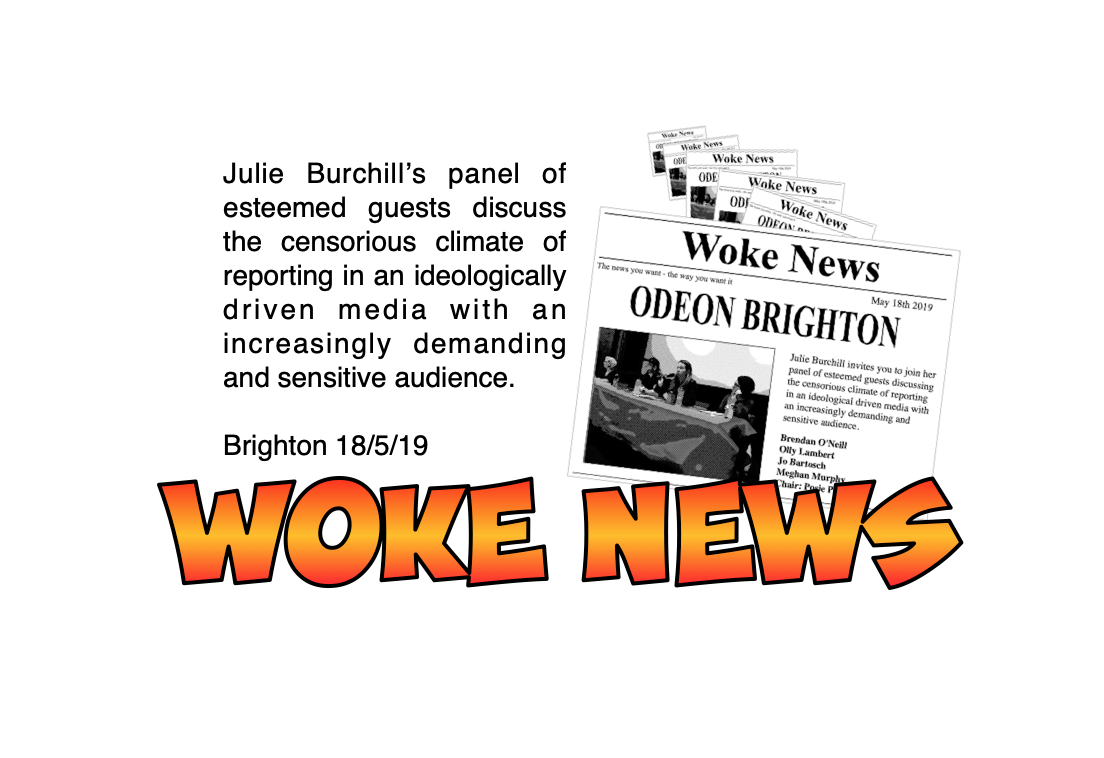 I woke up bright and early on that sunny Saturday. Bliss it was in that dawn to be alive- but to be ‘woke’ was very heaven! Lesley had driven down from north of Watford and we were poodling down the M23 with the sublime Decemberists playing on the CD player of her old Astra and talking about autogynephilia. As you do. We’d decided to drive rather than taking the train; bridges and sign posts scrolled overhead as we made the ninety minute trip down to the coast.
I woke up bright and early on that sunny Saturday. Bliss it was in that dawn to be alive- but to be ‘woke’ was very heaven! Lesley had driven down from north of Watford and we were poodling down the M23 with the sublime Decemberists playing on the CD player of her old Astra and talking about autogynephilia. As you do. We’d decided to drive rather than taking the train; bridges and sign posts scrolled overhead as we made the ninety minute trip down to the coast.
“Let’s just park in a car park,” said Lesley, “It could be a nightmare driving round for hours trying to find street parking.”
“Could be expensive,” I mused. “Ten quid? Fifteen?”
“Probably more like twenty. Let’s live big.”
We drove straight to the huge NCP car park behind the venue- thank you Google maps- where we were confronted with the horrifying reality of the parking costs that we had so conservatively estimated. THIRTY TWO POUNDS! We looked about us but- horror!- there was no escape. Some other poor beguiled soul had driven up behind us and we were unable to retreat. Quite aware that the car park was working out almost as expensive as train tickets would have been, we took a deep breath, made the most of it and drove, Cagney & Lacey style, straight to the roof.
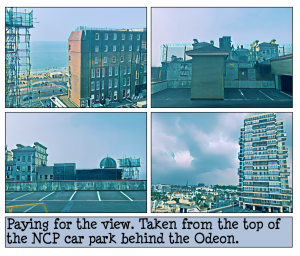 It took a surprising number of twists and turns to reach the top of the car park, and the view was not what we had expected. On one side rooftops; on two others the tawdry, grubby backs of buildings and from the fourth, through a gap in two large constructions, we could just glimpse the sea.
It took a surprising number of twists and turns to reach the top of the car park, and the view was not what we had expected. On one side rooftops; on two others the tawdry, grubby backs of buildings and from the fourth, through a gap in two large constructions, we could just glimpse the sea.
The air was uncannily silent and ours was the only vehicle up there.
“Do you think anyone ever comes up here?” I wondered aloud.
“My local car park had so many people jumping off it that they had to fence off all the upper sides so there’s no way off.” responded Lesley, putting her jacket into the boot of the car. “They put up a lot of Samaritans posters too. Do you want to leave your hoodie in the boot?”

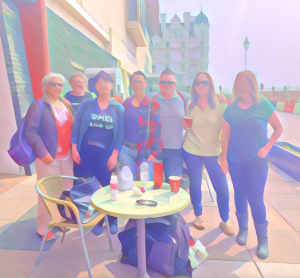
We stared at the drop to the ground for a few moments, then found the lift downstairs and onto the street.
The meeting, which had been sponsored by Julie Burchill, was to take place in the ODEON cinema opposite the sea front. Beneath the cinema nestled a COSTA coffee. Oh happy day.
I spied some familiar faces sitting on the chairs outside, holding steaming drinks in the sunshine. Friends! Coffee! It was shaping up to be like a good day already, discounting the horrendous parking fee.
The Event


I took the portrait photographs below (and the snapshots above) in the bar at Jury’s Inn, after the event. The bar was abuzz with conversation and all the speakers were kind enough to have a chat with me and be photographed. Julie explained the importance of sponsoring events like this one, bought us all drinks and was happy for me to photograph her.
“I just hired the venue, I didn’t get involved,” she told me, offering me another drink. “No? Are you sure? Venice and Posie are such a breath of fresh air. It’s important that the people who can afford it help out however they can.”
Olly Lambert wasn’t there, so I didn’t get to photograph him.
I’ll be dealing with his talk in part 2.
The host, the Chair and the speakers
The text in the descriptions below is from the Eventbrite page.
I’d just got a new phone so was excited to try out the portrait function on the camera. The panel kindly indulged me.
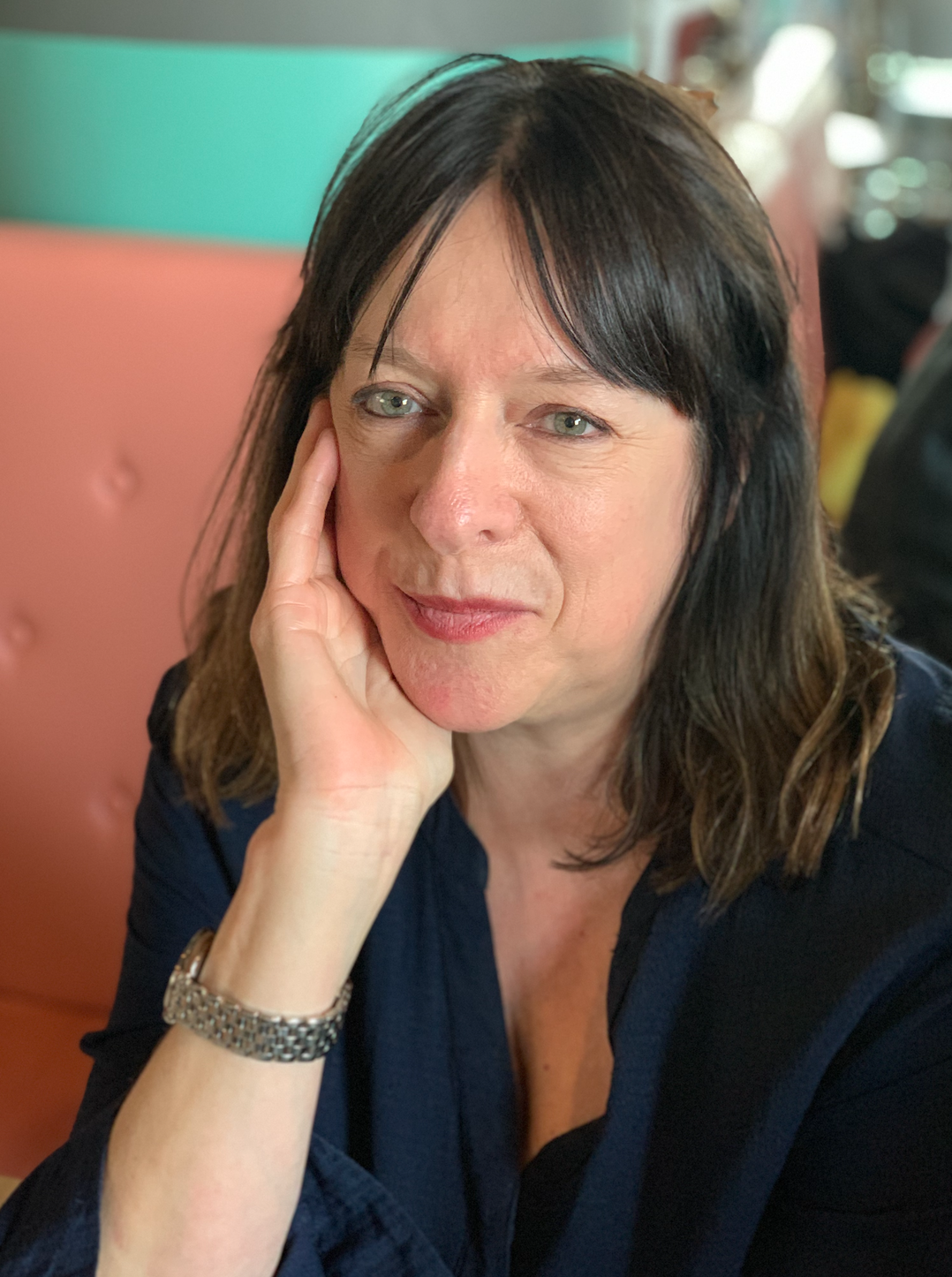
Julie Burchill invites you to join her panel of esteemed guests discussing the censorious climate of reporting in an ideological driven media with an increasingly demanding and sensitive audience. This event includes an exclusive viewing of a short film.

Jo Bartosch is a journalist campaigning for the rights of women and girls, she has been published in Unherd, Conatus News, Uncommon Ground Media, Feminist Current, New Statesman, Spiked, Morning Star and The Independent. She is a founding member of Critical Sisters.
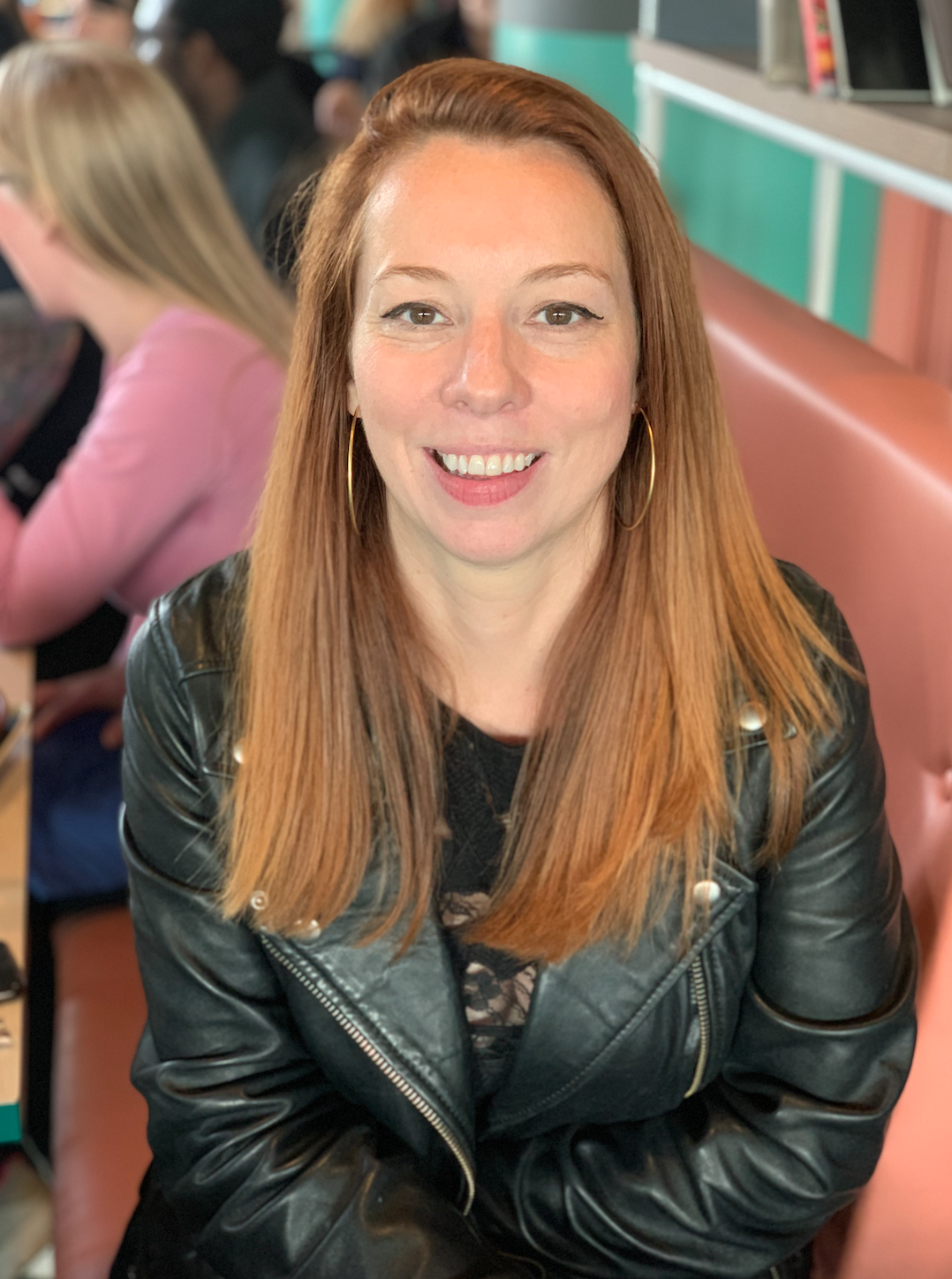
Meghan Murphy is a freelance writer and journalist, and is the founder and editor of Feminist Current. She completed a Masters degree in the department of Gender, Sexuality, and Women’s Studies at Simon Fraser University in 2012.
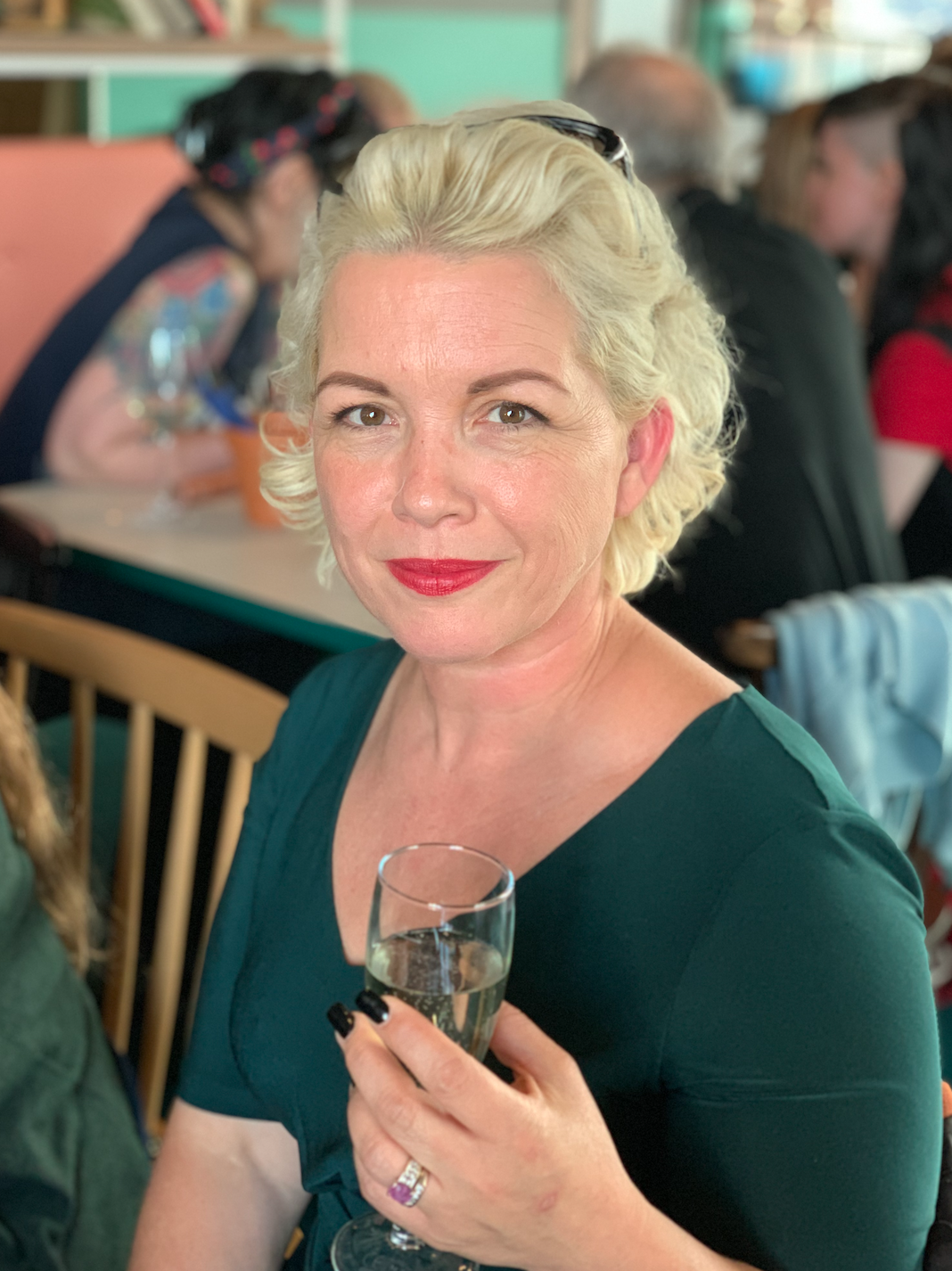
Chair: Posie Parker is a women’s rights campaigner and runs Standing For Women.
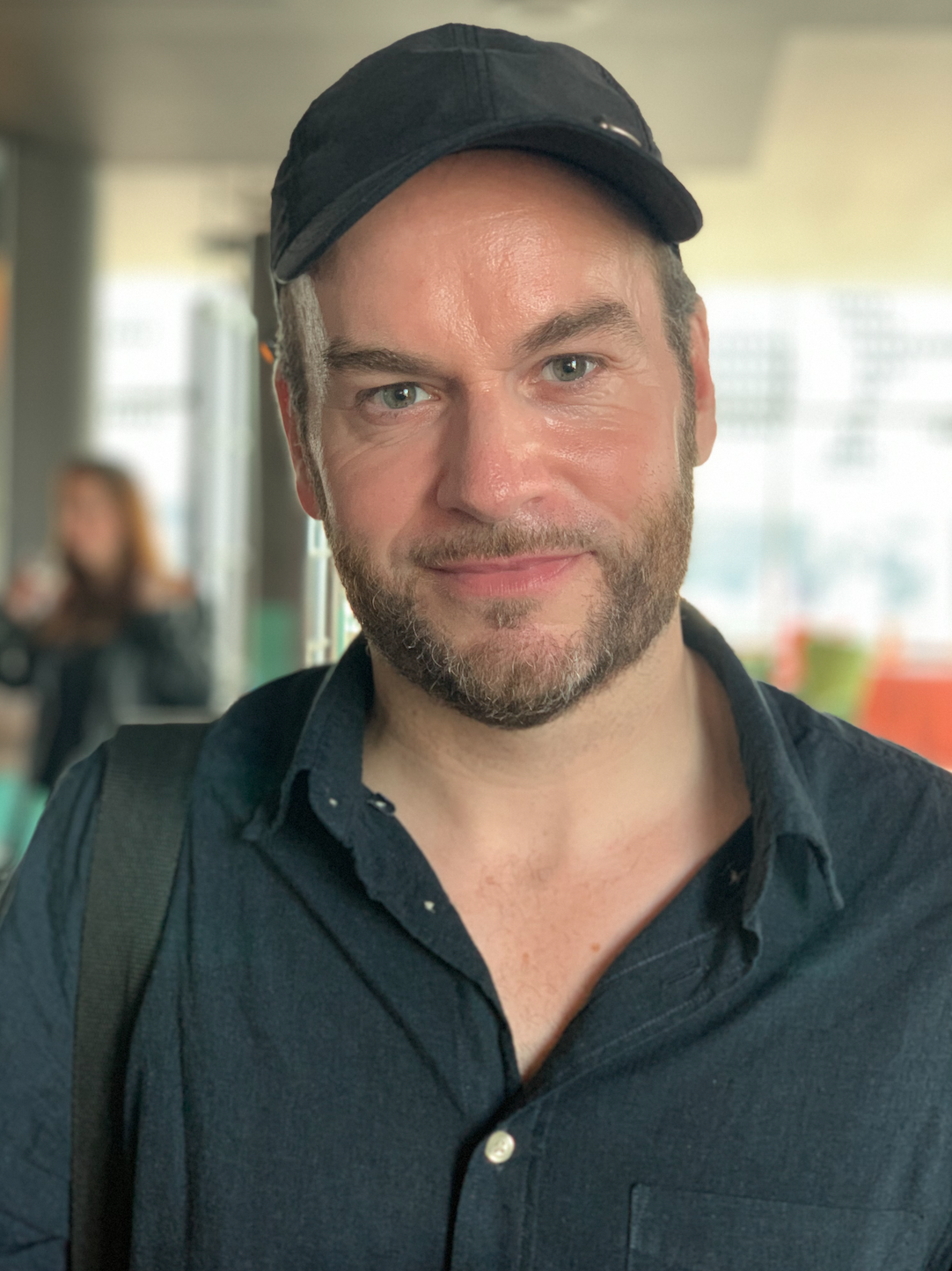
Brendan O’Neill is a British columnist and editor. He is the editor of Spiked, a writer for The sun and The Spectator, and author of the collection of essays “Anti-Woke”.
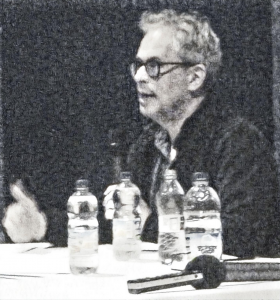 Olly Lambert is freelance documentary film maker and has won over a dozen awards for work in areas of conflict, including an Emmy, two BAFTAs, an RTS, a Grierson and the Foreign Press Association award for Journalist of the year.
Olly Lambert is freelance documentary film maker and has won over a dozen awards for work in areas of conflict, including an Emmy, two BAFTAs, an RTS, a Grierson and the Foreign Press Association award for Journalist of the year.
I write about his talk in Part 2. (EDIT: I still haven’t written this up!)
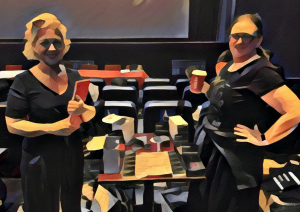
Posie & friend set up the ‘Standing for Women’ merch table
After finishing our coffee, we made our way into the venue, an actual cinema screening area. There was a bustle as speakers rustled papers, women- and some men- greeted each other. Standing for Women had a merch stall and I purchased a sheet of ‘adult human female stickers.
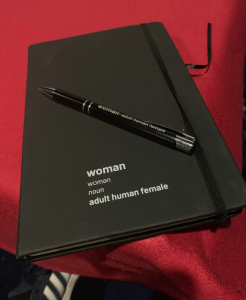
Lesley and I were chuffed to get seats in the front row. With my ‘adult human female’ notebook and pen on hand I was ready to start chronicling the event.
There was a short delay due to technical issues, Olly was running late and the cinema equipment didn’t like working with a Macbook, but eventually we were ready to go. Posie welcomed us to ‘Woke News’ and introduced the first speaker, Meghan Murphy.
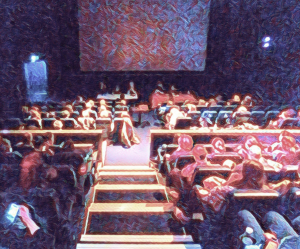
Meghan Murphy
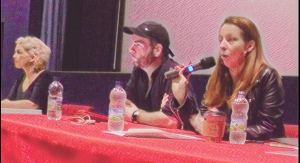
Posie Parker, Brendan O’Neill, Meghan Murphy
Meghan started by saying she was glad that the gender identity debate was being discussed in the UK and called the situation in Canada, where she lives, ‘a massive disaster‘.
She praised the British media for their coverage of gender identity legislation, policy and ideology. The Canadian media, she said, did not value free speech. It had barely covered the event she organised in Vancouver in January, ignoring press releases from the organisers, and the fact that threats of violence were made against both the speakers and the library, and focusing almost entirely on the protests. Over 250 people attended- and up to 200 transactivists protested outside.
Speakers at the event were Meghan herself, a young detransitioned woman and Dr Kenneth Zucker. The Canadian media, says Murphy, pushes the idea that on the subject of gender identity one is either progressive and liberal or as a right wing christian bigot: there is no middle ground, whereas the British media are asking important questions and realises that there are genuine concerns.
“The journalists here are doing their job. In Canada,” she tells us,” “Not a single media outlet has contacted me ever for an interview about my work on this. Not one outlet reported on my Twitter ban, despite it being reported throughout the US.”
She spoke of how the Canadian government protected the identity of a Canadian man who tried to sue fourteen aestheticians for not giving him a bikini wax. The media not only protected his identity, but it did not protect the anonymity of the women he was trying to extort. Reports on the incident perpetuated the notion that he was a woman by using female pronouns in their reports.
“No outlet has published coverage of the feminist analysis of gender identity except to smear and label us as transphobic.“
Most often quoted in the Canadian media is transactvist Morgane Ogre, who advocated for a $30,000 grant to be dropped from Vancouver Rape Relief. Murphy writes about this here. Ogre accuses Murphy of ‘spreading hatred and discrimination towards trans people’ because she refers to males as ‘he’, even if they identify as ‘she’.
Murphy refers to Ogre as a ‘an unhinged man who harasses, bullies and libels.’
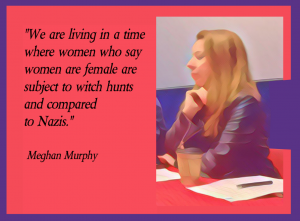 “Literally everything tranactivists do is turned around on to us, onto women who are defending women’s rights We’re accused of violence, of harassment, of bigotry, hatred, biological essentialism, of being oppressors and so on and so forth.” says Murphy, who has lost long-term friends who have brought into the propaganda.
“Literally everything tranactivists do is turned around on to us, onto women who are defending women’s rights We’re accused of violence, of harassment, of bigotry, hatred, biological essentialism, of being oppressors and so on and so forth.” says Murphy, who has lost long-term friends who have brought into the propaganda.
“It’s the most insane, Orwellian reversal because this entire transactivist movement is built only on lies. It’s not about rights. It’s not about protecting people against violence and discrimination. It’s about forcing people- under threat of violence, blacklisting, ostracising and criminisalisation- to pretend that it’s possible to change sex, that there’s no such thing as a woman, that women aren’t allowed to have boundaries or their own spaces and that in fact women don’t need rights or spaces because they don’t suffer discrimination, or oppression. They’re not a class of their own and in fact it’s only transgender people who are the most oppressed and marginalised people on Earth.”
This movement of silencing women and centering male voices is done mostly by white, middle class, Western, university educated men and this is what feminists mean when they refer to transctivism as a men’s rights movement.
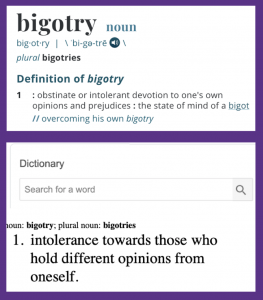
She reminded us of the definition of ‘bigotry and asked “Who is committed not to engaging or discussing.. who is committed to their own ignorance to the point that they would rather stand outside and shout lies instead of coming inside and listening to what we are saying; engage respectfully, as we always do, and try to come to an understanding?”
As an example of this, Murphy points out that two of the chants the protestors chose were: ‘Protect Trans Youth’ and ‘Let Kids be Kids’– the very issues those attending the meeting were talking about. Murphy challenges the idea that hearing opinions diametrically opposed to our own is somehow traumatic, as discussed in the book ‘The Coddling of the American Mind‘ and she believes that there is a broader social trend towards ‘anti-intellectualism and refusal to think’ and away from critical thinking, not just in the area of trans issues but throughout society as a whole, and that it seems to originate on college campuses.
The media is culpable in this, says Murphy, because they are choosing to report lies. Journalism does not exist to promote ideology. It exists to hold institutions and powerful people to account, and to enable democracy. instead, the media is stopping people forming opinions based on facts.
Biological and material reality is not something intangible, offers Murphy. We should be having conversations and rigorous public debate about these issues which primarily affect women and girls and their right to live as autonomous beings. This is not progress, it is shameful. It will be looked back on with remorse as we wonder how society could have let it happen.
“Thank you,” concluded Meghan. “Sorry to be so negative.”
“Canada sounds an absolute delight for women,” observed Posie, thanking Meghan after the applause had died down, and reminding the audience that the hashtag for the afternoon was #WokeNews. She announced that the technical problems had been overcome and the slides for Bartosh’s talk were ready. “Here’s Jo.”
Jo Bartosh
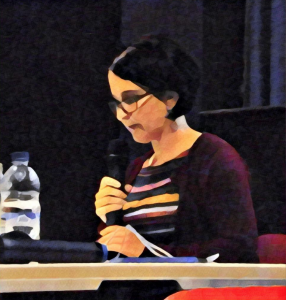
Jo Bartosh
Bartosh said she used to chair a large feminist group and write a coloum for her local paper. She wrote a piece, published in the Independent in 2017, about a 12 year old girl who decided she was a boy after discovering ‘trans’ YouTube and Tumblr. The child bound her breasts, was affirmed by her school and was looking forward to turning 18 when she could have a double mastectomy. Her mother supported the change of name but had refused to allow medication. After four years, the child realised she was a lesbian and considered herself lucky to have avoided a medical pathway to transition.
The public response to Bartosh’s article was mixed. Some thanked her for raising an important issue, others accused her of transphobia and inciting violence towards trans kids.
Natacha Kennedy’s comment, Bartosh observes “seemed to suggest I was advocating for some sort of genocide against children.”
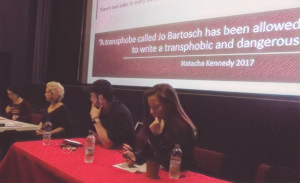
Natasha Kennedy, who also goes by the name Mark Hellen, claimed Jo’s article was ‘transphobic and dangerous’.
Two weeks after publication, the Independent requested that Bartosh re-write her article in accordance with the WPATH guidelines. WPATH are a lobby group and ‘certainly not impartial on these matters’.
Bartosh considered editing the article but decided that telling the truth was more important. She has never since had a piece accepted by the Independent.
‘Reporting the truth has never been more important.’
Jo then showed us a slide of some of the online abuse she had received from transactivists.
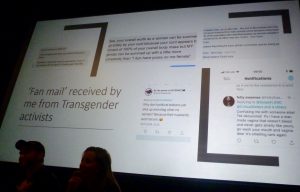
Comments included, “I would happily shit down your throat a thousand times. Goodbye I hope you get cancer” and “I have a man made vagina that doesn’t bleed and never gets smelly like yours.”
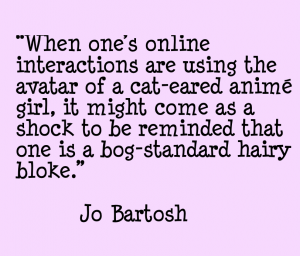
Bartosh observes that our identities are more and more frequently forged online. These ‘new, shaky, fractured, virtual selves’ are not anchored in reality and are often threatened by the slightest question. As such, mild challenges often lead to rape and death threats.
Moral worth and status’ in the online world, liking the ‘right’ tweets and following the ‘correct’ accounts is an important part of maintaining these fragile egos, and fact and debate are seen as ‘phobic’.
Truth & the Duty of the Media to Uphold it
Rather than uphold the truth, the mainstream media has become ‘complicit in repeating politically correct but morally wrong lines,” says Bartosh. “It is not the job of journalists to coddle the egos of the delusional.”
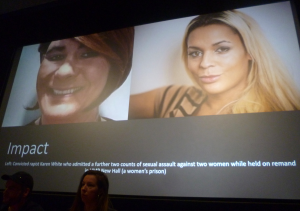
Bartosh referenced the cases of Tara Hudson (right) and Karen White, men who were placed in women’s prisons, and how these cases were dealt with by the media.
White, a convicted rapist, went on to sexually assault fellow inmates.
Bartosh argues that the media has an obligation to report on these cases accurately.
“When it comes to reporting on people who are transgender they are out of step with public opinion, and indeed with reality.”
Reporting such as this (below) suggests that recent attacks have been carried out by women, said Bartosh, which is not true. She observed that every week it seems a new story emerges where a woman is reported to have committed a violent crime. The BBC replied to Bartosh’s complaint by saying reporting in this manner was ‘consistent with their style guide’.
The BBC is proud of its close working relationship with Stonewall and 417 employees, according to a Stonewall/BBC survey, identify as trans.
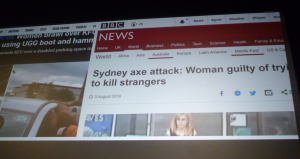
Headlines: “Women brawl over KFC disabled parking space” and “Sydney axe attack: woman guilty of trying to kill strangers”
Bartosh spoke of the concept of regulatory capture, where governmental bodies are taken over by special interest groups and become the equivalent of lobby groups themselves. Such reportage ‘turns its back on the truth in favour of promoting an ideological stance’.
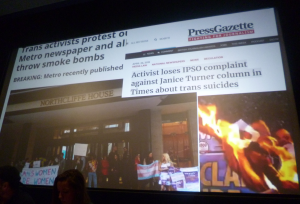
recent smoke bombs and newspaper burning
Referring to recent events involving transactivists setting off smoke bombs outside newspaper offices and burning copies of the Morning Star in the streets, Bartosh observed:
“There is an irony that these people call those calling for truthful reporting ‘fascists’… destroying writing that threatens a powerful ideology and working to prevent freedom of expressions are the tenets of fascism and bigotry.”
Bartosh admits it is not easy for journalists to break out of this style of reporting: not towing the ‘politically correct line’ will get you called a ‘deranged, Trump-supporting Christian fundamentalist‘. Journalists who are willing to speak up lose income and receive death threats. Criticism of a damaging and dangerous political movement, she observes wryly, does not pay, adding that “reporting the truth is difficult when you are told that doing so is causing transgender people to kill themselves” and when balance has been reframed as hatred. Self-censorship, Bartosh believes, can be a bigger threat to free expression than state censorship and it has never been more important to speak unpopular truths such as transwomen are men and transmen are women.
“We each have a duty to speak up,” she concluded to loud applause, “and call bullshit on woke news.”
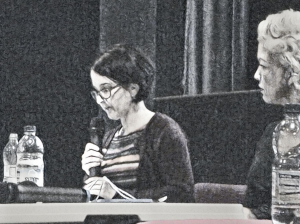
Jo Bartosh and Posie Parker
The next speaker, announced Parker, was Brendan O’Neill ‘…and I think we know were in a lot of trouble when someone as… controversial-shall we say… as Brendon sometimes uses ‘preferred pronouns .’
Brendan O’Neil
After thanking us for inviting him into our ‘coven’, Brendan spoke of his Catholic childhood and being expected to believe that the communion bread literally became the body of Christ. Rather than accepting this giant leap of faith, he said, he decided ‘this is bullshit‘ and he feels the same way about the idea that a person can somehow change sex.
O’Neill views the persecution of women who don’t accept gender ideology in the same light as the witch hunts which took place within Catholicism against those who wouldn’t accept transubstantiation. As for ‘preferred pronouns’, he added that after discussion with Posie and others, he was changing his mind about using them.
He expressed concerns about the transitioning of children and believes that confused children are being ‘completely screwed up’ as a result of ‘the unwillingness of society to accept the basic fact that a man can never become a woman’. You can’t become a woman simply by declaring it to be so, or ‘realising’ it via inner intuition.
‘That is profoundly, deeply misogynistic.’
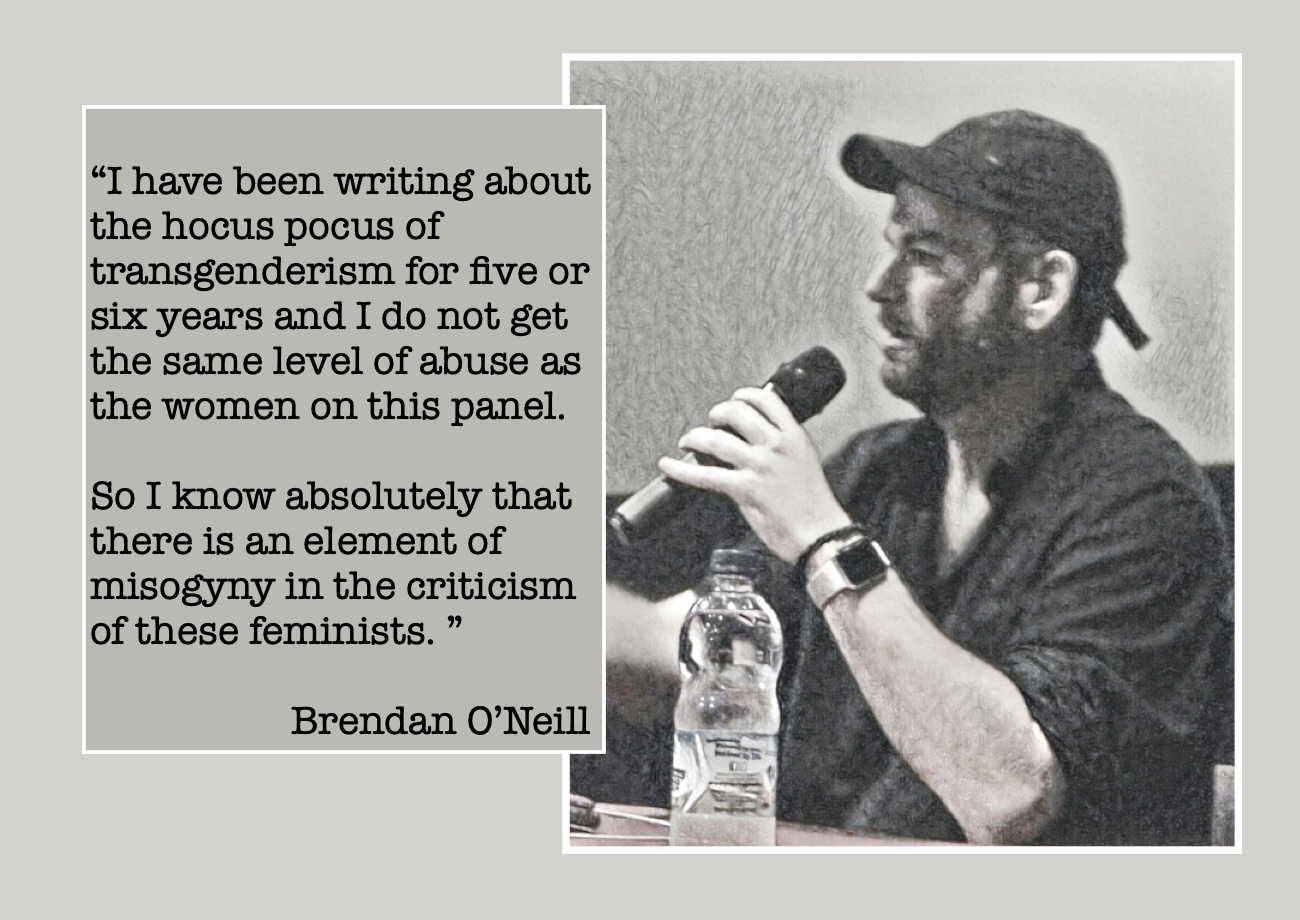
Within the very idea that a man can become a woman is the reduction of womanhood to ‘the most shallow, surface-driven thing‘, depriving womanhood of its content, depth and historical reality.
O’Neill referenced the viral ‘ma’am’ video, observing that the sales assistant was told:
“if you want to see a ‘sir’ come outside and I’ll show you a ‘sir‘!”
What the man in the video was saying is ‘I am a woman, and if you don’t accept that I will use male violence against you.’. This threat of violence from within the trans movement is frequently used to silence female voices.
The super-sensitivity of the trans movement interests O’Neill: he told us how a candlelit vigil, ‘for all the trans people I’d killed‘, greeted his speaking at Oxford University. Any form of criticism of the trans movement is interpreted as an assault on the right of trans people to live. Speculating on where that ‘super-sensitivity’ comes from, O’Neill purports that it is rooted in the realisation that the reality of ‘gender identity’ is that it is built on nothing. He calls this ‘fearing the disinfectant of sunlight’ which results in a desire to shut down all forms of questioning or debate.
“Censorship is fundamentally about preventing people from asking awkward questions, from trying to discover the truth and from having a reasonable critical debate… it’s the means that powerful or influential groups use to deflect criticism… to prevent ordinary people from asking questions and seeking truth. ‘Trans Orwellianism’, the trans clampdown on anyone who asks the wrong questions, is fundamentally about preventing people from arriving at the truth.”
Brendan observed the key importance of the term ‘phobia’ in the new censorship. Feminists that question trans ideology are called transphobic, feminists that question the treatment of women under radical Islam are called Islamophobic. He suggested that the branding of Christians who oppose gay marriage as homophobic serves a similar purpose, as does calling those with concerns about immigration – here he added that his own parents were immigrants- xenophobic. It is all about silencing people. The most important thing about freedom of speech, he concluded, is that if you defend freedom of speech you have to defend it for everyone, however much you may disagree with them. Consistency is essential.
“It is in the interests of those who believe in truth to defend freedom of speech… if you put truth and falsehood in battle in the public sphere, truth will always win.”
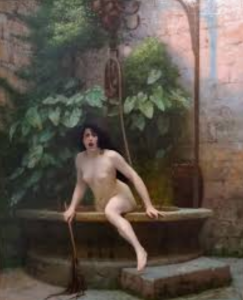
Olly Lambert’s talk at ‘Woke News’ will be dealt with in a different post.

Excellent